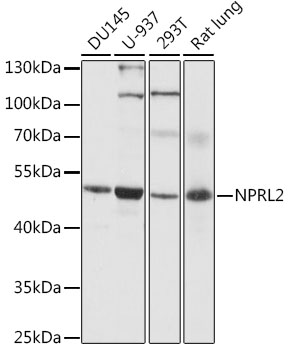-
Product Name
NPRL2 Polyclonal Antibody
- Documents
-
Description
Polyclonal antibody to NPRL2
-
Tested applications
WB
-
Species reactivity
Human, Rat
-
Alternative names
NPRL2 antibody; FFEVF2 antibody; NPR2 antibody; NPR2L antibody; TUSC4 antibody; NPR2-like, GATOR1 complex subunit antibody
-
Isotype
Rabbit IgG
-
Preparation
Antigen: Recombinant fusion protein containing a sequence corresponding to amino acids 1-220 of human NPRL2 (NP_006536.3).
-
Clonality
Polyclonal
-
Formulation
PBS with 0.02% sodium azide, 50% glycerol, pH7.3.
-
Storage instructions
Store at -20℃. Avoid freeze / thaw cycles.
-
Applications
WB 1:500 - 1:2000
-
Validations

Western blot - NPRL2 Polyclonal Antibody
Western blot analysis of extracts of various cell lines, using NPRL2 antibody at 1:1000 dilution.Secondary antibody: HRP Goat Anti-Rabbit IgG (H+L) at 1:10000 dilution.Lysates/proteins: 25ug per lane.Blocking buffer: 3% nonfat dry milk in TBST.Detection: ECL Basic Kit .Exposure time: 10s.
-
Background
As a component of the GATOR1 complex functions as an inhibitor of the amino acid-sensing branch of the TORC1 pathway. The GATOR1 complex strongly increases GTP hydrolysis by RRAGA and RRAGB within RRAGC-containing heterodimers, thereby deactivating RRAGs, releasing mTORC1 from lysosomal surface and inhibiting mTORC1 signaling. The GATOR1 complex is negatively regulated by GATOR2 the other GATOR subcomplex in this amino acid-sensing branch of the TORC1 pathway.; Suppresses Src-dependent tyrosine phosphorylation and activation of PDPK1 and its downstream signaling. Down-regulates PDPK1 kinase activity by interfering with tyrosine phosphorylation at 'Tyr-9', 'Tyr-373' and 'Tyr-376' residues. May act as a tumor suppressor. Suppresses cell growth and enhances sensitivity to various anticancer drugs.
Related Products / Services
Please note: All products are "FOR RESEARCH USE ONLY AND ARE NOT INTENDED FOR DIAGNOSTIC OR THERAPEUTIC USE"
